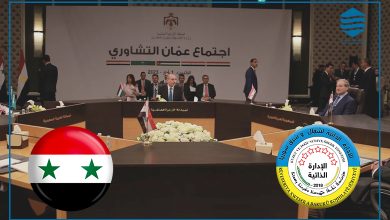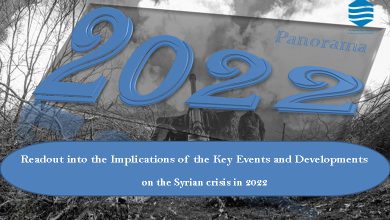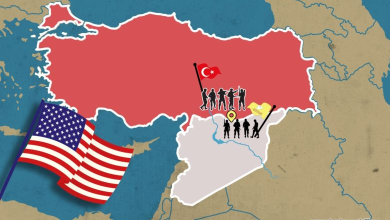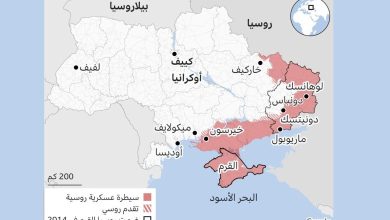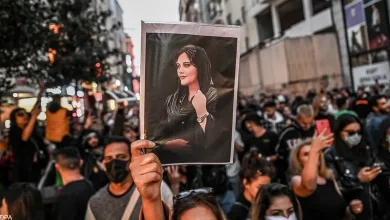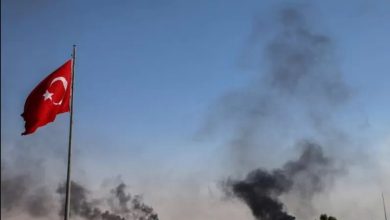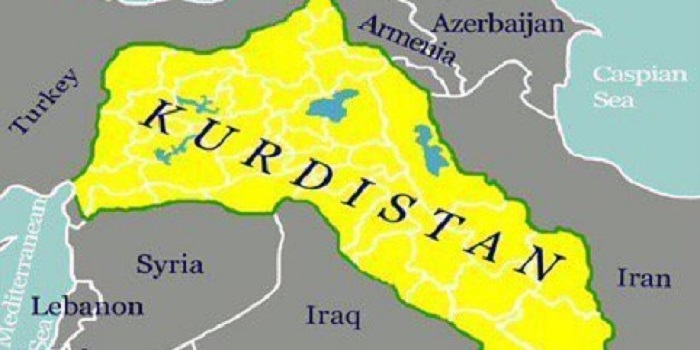
Geopolitics Developments of the Kurdish Cause in the Middle East
Al- Furat Center for Studies- Translation Department
Also Available in (Arabic)
On the Kurdish level, the most optimistic Kurds would not expect that the first two decades of the twenty-first century would witness Kurdish entities, one of which is officially recognized as the “Kurdistan Region of Iraq,” and the second one awaits recognition “the Autonomous Administration of North and East Syria.” The two entities have enjoyed the support of global powers and the international coalition, under multiple slogans, the most important of which are democracy, protection of minorities, and so on.
The present data indicate that both entities were able to establish an administrative, political and military structure, despite being in difficult regional and international circumstances, which made the Kurds an important figure within the regional equations, and partners of major international powers, in their policies and strategies inside the Middle East region. This partnership was represented in the fight against the terrorist organization, ISIS and created some geopolitical balances in the region for many international parties.
The growth of the Kurdish self-factor
Considering the developments of events in the Kurdish sphere during the past ten years at least, it is simply possible to observe the new Kurdish political structures have now enjoyed political formations and administrative entities capable of organizing the Kurdish rank, in spite of their differences. They created a state of revolutionary at various political, social and cultural levels within the Kurdish society. Furthermore, they changed the political and social realities of the Kurdish society, which suffers from traditional structures that do not keep pace with the global and regional political developments and turning them towards keeping pace with those facts and developments, and the possibility of taking advantage of them in favor of the Kurdish people.
More importantly, the Kurds today have the political and strategic capabilities that qualify them to play on the political lines in the Middle east and somehow to win a Kurdish entity. Especially after, they received direct support from the superpowers, in order to consolidate the foundations of the existing administrative structure in Syria and the existing federalism in Iraq. These indicators – in the political perspective – may lead to historical steps by the international community towards the Kurdish people and its issues, which have a historical legal basis in accordance with the Treaty of Sevres, which recognized the political and national rights of the Kurdish people, before the Allied power retreated later in the Lausanne Agreement according to their interests. These features are:
- Today, the Kurds possess a military force composed of hundreds of thousands of valiant fighters, who have proven to the whole world the extent of their ability and their strong will in confronting their enemies, when they faced the most powerful terrorists of this era, the fighters of the Islamic State (ISIS). Whether in Syria or Iraq, in which they practiced the methods and quality of modern combat and gaining military experience during their battles that will not be underestimated in the future.
- Since the human resource is of paramount importance in any Kurdish political project, it can be noted that the Kurds have never been absent from the global scientific arena and the current phase witnesses the emergence of many Kurdish scientists, at various scientific levels and its main sectors. In addition to the availability of administrative qualifications, and highly qualified scientific people, and practical experiences, to lead the current historical phase and launch the Kurdish project on sound foundations and scientific pillars that keep pace with the present realities, and accommodate international and regional policies and strategies that affect the entire region, and their position within those strategies.
- On the other hand, and as has not happened in recent history, the Kurds today have geography, which are areas rich in underground resources, especially oil, in addition to many other economic resources, such as large areas of agricultural land, and tourist areas. Plus, their geostrategic location, with the borders of both Iran and Turkey, and the Arab countries, which is of considerable importance to international powers, that might constitute a geostrategic necessity, in the future, for those powers.
- The other point that can be pointed out is that the Kurds and the Kurdish issue, in general, have become a topic that is being discussed at the tables of senior politicians in the world and in international forums. Kurdish official delegations are received in many global decision-making centers, and by state leaders and high-ranking diplomatic figures. These are considered as real indicators that indicate the desire of countries who have influence in global politics to support the Kurds, to form a kind of internationally recognized political entity.
Today, none of these integrated and available components have ever witnessed coming together with the hands of the Kurds in one phase in Kurdish history. They constitute strong tools for the establishment of a Kurdish entity if they are used in the required manner by the Kurdish forces and harnessed in the service of their people and other communities that live with them, away from party disputes, close-minded mentalities, personal interests, or comprador.
The growth of the objective factor and international balances in favor of the Kurds
The international political realities in the Middle East indicate a historical opportunity, which the Kurdish people can – if they make good use of – to achieve political gains, which they have always aspired to achieve. The invader regimes of Kurdistan are experiencing dramatic and difficult conditions in their relations, whether within the societal community or with the international community.
The political developments in the Middle East, whether the Arab revolutions, the developments of the Iranian nuclear file, or the mechanisms and tools of the new Turkish policy, and the consequences these events had on both regional and strategic geopolitical realities associated with the international powers. Who came to the region in the wake of these developments with their political and military weight, produced new political structures, and alliances that did not exist before now. Thus, the Kurds became a factor that these forces depended on to create compatible mechanisms with their visions, or their policies within the countries in which the Kurds are present. They even became a factor through which the superpowers can strike some balances with regional countries, and even influence their policies towards heated issues in the region, and make the developments that are taking place an extension of the strategic interests of those countries.
By reading the political reality, the real components of the existing political systems in the region, and the nature of the development of their relations with superpowers, in the context of strategic policies and the rapid pace of events. It can be said that the Kurdish situation is closer than ever before, to set up lines of communication with international powers, and demonstrating the ability of Kurdish formations to form a new political and democratic pattern in the region. In light of the role decline of the existing regimes, or the collision of their policies and interests with the policies and interests of the superpowers in the region, which can be embodied as the following:
Whether in Iraq or Syria, these regimes live in a state of continuous deterioration and the depletion of most of their authoritarian and statist elements, and they still resist surviving. Therefore, according to current developments and the presence of superpowers and states on the ground, it is no longer possible to take military action against the Kurdish regions that might terminate the existence of these two existing entities.
As for Ottoman Turkey, many confrontations and repulsions have become a major theme of the nature of its relations with the United States and most of the Western countries, despite being a member of NATO. The past years have witnessed various forms of that clash, especially between Turkey and the United States, from the S400 missile deal to strategic economic projects in the energy sector and their transfer between Turkey and Russia, to economic sanctions and to direct threats from former US President Donald Trump to Erdogan. This reflects a state of informal fragmentation in Western-Turkish relations, which cannot be repaired in the near future amid the visions and strategies set by the Turkish government, and its political extensions in the region, which are incompatible with Western interests and strategies, especially the United States of America.
The observer or follower of the political situation in the Middle East will not have much trouble in discovering clearly the nature of the miserable relationship between the Iranian regime and the United States of America. Due to the complexity of the nuclear file, and the latter’s total opposition to Iran’s nuclear ambitions, which casts a dark shadow on the nature of the relationship between the two parties. Plus, its negative repercussions on the entire region, in light of the Iranian regime’s development of political, military or economic tools in the region, with the aim of supporting its nuclear positions, policies, and ambitions.
Therefore, perhaps the existing political conditions in the region – and within the aforementioned – may provide a real opportunity for the Kurds to assume a political position in the region, which may lead to the recognition of a Kurdish entity at the international level.
Partisan disagreements produce self-brakes
Considering the political and strategic realities at the Kurdish level, it can be said that the psychology of leadership thought, and the mechanisms of transition to a state, have not yet been created for the Kurds. The interrelationships and the strategic, political and even diplomatic cooperation between the Kurdish parties are still at its minimum level. It is governed by partisan agendas and by unilateral policies, far from the aspirations and expectations of the Kurdish people, driven by partisan ideology, and further deepening the results of differences on the ground. However, we can go further than that, by saying that it produces political structures that contribute to a state of self-braking of the declared aspirations of the Kurdish parties, and of the dreams of the Kurdish people. Due to the dominance of the partisan mentality, the narrow strategic prospects, and the absence of a common Kurdish body, which the various Kurdish parties believe in and support.
This situation produced a societal reality, narrowing down the Kurdish aspirations of the Kurdish people with partisan aspirations and agendas, linking many active groups within the Kurdish society, whether at the political level, or at the cultural and economic levels with the partisan situation. This creates a kind of tools that attract these groups to the crucible of work, in order to consolidate the authority of political parties, and achieving their goals. Instead of patriotic or national goals, which were the main motive for the involvement of active and educated Kurdish youth, with all their competencies, in the ranks of these parties. In a way that formed mechanisms capable of harnessing these forces, whether human or economic components or even the diplomatic relations of the parties that arose in the wake of the new geopolitical and international balances in the region, serving partisan successes and its internal interests, not the national ones.
Accordingly, the Kurdish parties never stop accusing each other, and work tirelessly – in the media and politically – to prove the other party’s mistakes, they sometimes even call for the necessity of destroying and terminating their opponents. This situation may create a state of singling out the Kurdish decision, a situation that the majority of Kurdish society would not favor, under any historical or political conditions.
The events that take place every now and then between the main parties of Kurdish politics reflect the true mirror of the Kurdish political reality and the relations between them, the dominance of the partisan mentality. In addition, the focus on the mechanisms and tools through which each one can attack the other, and try to weaken it and show its failure to the Kurdish public opinion in general.
The Kurds face a historical test
So far, the Kurds have spent long years of the struggle to achieve their national rights have not been successful with any political victories that could have led them towards their main goals. It is embodied in the formation of a Kurdish state, similar to the Arab states and the Turkish and Iranian states in the region, as they constitute one of the most important four nations in the region. Such a matter can be traced back to many historical causes, international balances, the policies of the superpowers in the region, or even to the subjective formations and structural combinations of the social and political environments of the Kurdish society.
If we neglect the extent of the strategic view of Kurdish politicians, and their engagement with the realities and events that took place in the region during the previous historical stages. This constituted one of the most important factors that contributed to the absence of the Kurds from the political arena in the Middle East, except in the form of political parties or groups who could not be able to keep pace with the formations and political entities of other existing nations in the region. However, it was often operating within a framework of political or strategic subordination to it. However, the current stage is witnessing their ability to form the necessary political, military and diplomatic foundations to build a Kurdish force in the region, and to use the possible tools to build alliances that are compatible with the existing geopolitical situation in the region today.
The Kurdish political reality today differs from the aforementioned. The Kurds have become aware of the reality and nature of the policies and interests embodied in the region, and they were able, within the current circumstances, to build an image for themselves, which can be said to be almost independent of the existing regimes in the region. By taking into consideration their interests and goals in establishing a Kurdish entity that may reverse the balance of power, alliances, and tools of the global system in the region. However, what is afflicting this new reality is the focus on the partisan ego, and the attempt to show these strategic successes at the Kurdish national level, as partisan successes.
Therefore, it can be said that the strategic dimension is what is required today within the halls and councils of Kurdish politicians, and their way of thinking and reading the future, if they want the best for their people and their children. Thinking about partisan gains and ideological differences will only be a means for interim gains, whose owners would not find in the near future anyone who supports their visions or their existing structures now if international relations changed, mixed, or the existing international interests changed in the region.
Unity of the two Kurdish projects in one structure
The present phase requires speeding up the implementation of Kurdish strategies, at the Kurdish level, which must correspond to the interests of the superpowers, or be an extension of them, so that it would not be an impediment in the way of its implementation. After all the subjective components that the Kurds have, and in the face of many objective conditions that could constitute a new historical era in the Middle East, in which the Kurds may appear – politically – with unprecedented power. What is required of the Kurds and their political vanguards to hold their historical responsibility, to leave their partisan differences, and rise to the level of the national sense and its historical realism, so they would not miss an opportunity that may not be repeated in the near future.
Accordingly, one of the most important proposed scenarios stems from the historical imperatives of the Kurdish people’s self-determination, based on a well-defined accord, in which the structural combination of a democratic society as a fact unites with the fact of the Kurdish-bourgeois nation-state alliance. This can be revealed for the first time in the history of the modern Middle East, the establishment of a nation-state dominated by the components of a democratic society. These two facts will play their role together within the aforementioned union, which is based on a binary system compatible between the reality of the democratic society and its societal visions, and the Kurdish nation-state, whose true nucleus will be the Kurdistan region of Iraq, which takes Capitalism as its basis.
Therefore, this statist model can be built, by agreement between the democratic society and the Kurdistan Regional Government (KRG), so that Erbil constitutes its center. while the Autonomous Administration in Syria can form a political and administrative entity linked to the same center, provided that the form of this link is formally agreed upon both Politically and administratively, in order not to fall into the trap of repeating past historical mistakes, and not to be drawn into national-state policies with strict borders.
Formation of a unified Kurdish project with clear objectives
The Kurds are on the threshold of a pivotal phase in their history, in which they must be clear in their demands and endeavors, and consolidate their ranks. Today the international and regional conditions are more favorable than at any time in the past, and the subjective factor in light of the availability of most of the political and economic components, strategic thinking masterminds are only needed. Those who are able to bring about integration, to connect the main aspects of the Kurdish issue, and turn it into a reality that is accepted by the international community and the consensus of its superpowers.
Therefore, it can be said that it is necessary to form cells or strategic units at the Kurdish level, to set clearly the interim plans and goals necessary to achieve the aspirations of the Kurdish people. These cells should work on researching the policies and mechanisms through which these goals can be reached.
The main task of these cells or structural units, according to the proposed perspective, is to establish the structure of a unified Kurdish project within the scenario presented above. It does not recognize artificial borders, does not distinguish between the Kurdish people in the different countries in which they live, and promotes the supreme interest of the people above all other political considerations. Away from the partisan disputes that exist between the major Kurdish parties, emphasizing that these cells or units, at various levels, are formed as a legal cell, An economic cell, a political cell, a social cell, and a diplomatic cell, each one would works to establish the right and real foundations that lay the foundations for that strong structure. In order to win a recognition of the geographical, historical, and political rights of the Kurdish people, if these units or cells would have high-level of coordination among themselves. So that, it would reach realistic political outcomes that would form a Kurdish political project, through which the Kurds can knock on the largest doors of international forums, and put it on the tables of their politicians, to extract a recognition of the Kurdish people and their national rights, and moving on to an officially and internationally recognized entity.
